HR Report: Developing Individual, Teams, and Organizations at Tesco
VerifiedAdded on 2021/01/02
|18
|5335
|77
Report
AI Summary
This report examines the HR practices of Tesco, a British multinational grocery and general merchandise retailer. It explores the knowledge, skills, and behaviors required by HR professionals, including management, trend analysis, technical expertise, and employee relations skills. The report also presents a personal skill audit and professional development plan for an employee, Jane Cambridge, addressing her strengths and weaknesses in IT, communication, and problem-solving. Furthermore, it differentiates between organizational and individual learning, highlighting the importance of continuous learning and professional development for sustainable business performance. The report also discusses how high-performance working contributes to employee engagement and competitive advantage, along with different approaches to performance management that support high performance and culture commitment within the organization.
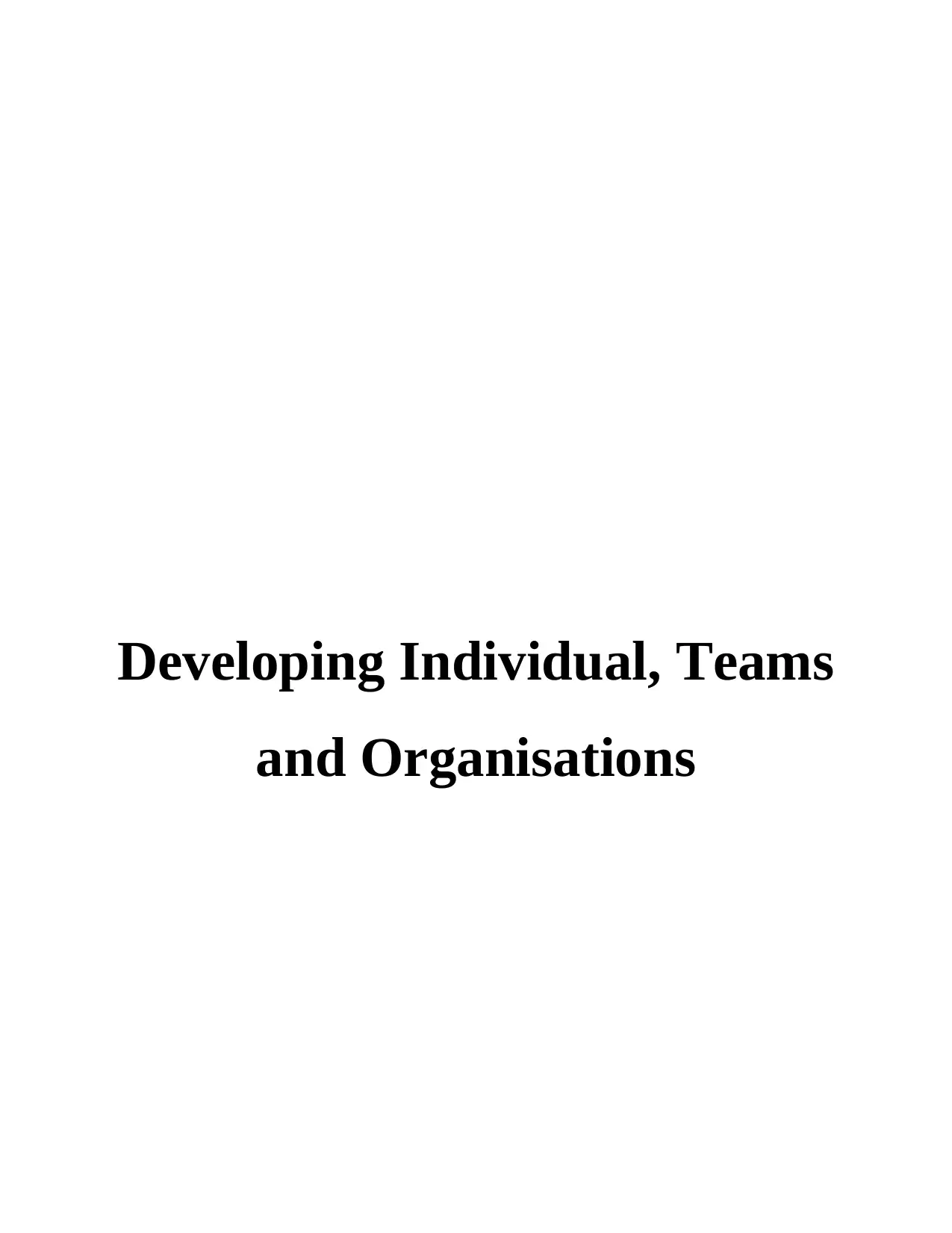
Developing Individual, Teams
and Organisations
and Organisations
Paraphrase This Document
Need a fresh take? Get an instant paraphrase of this document with our AI Paraphraser
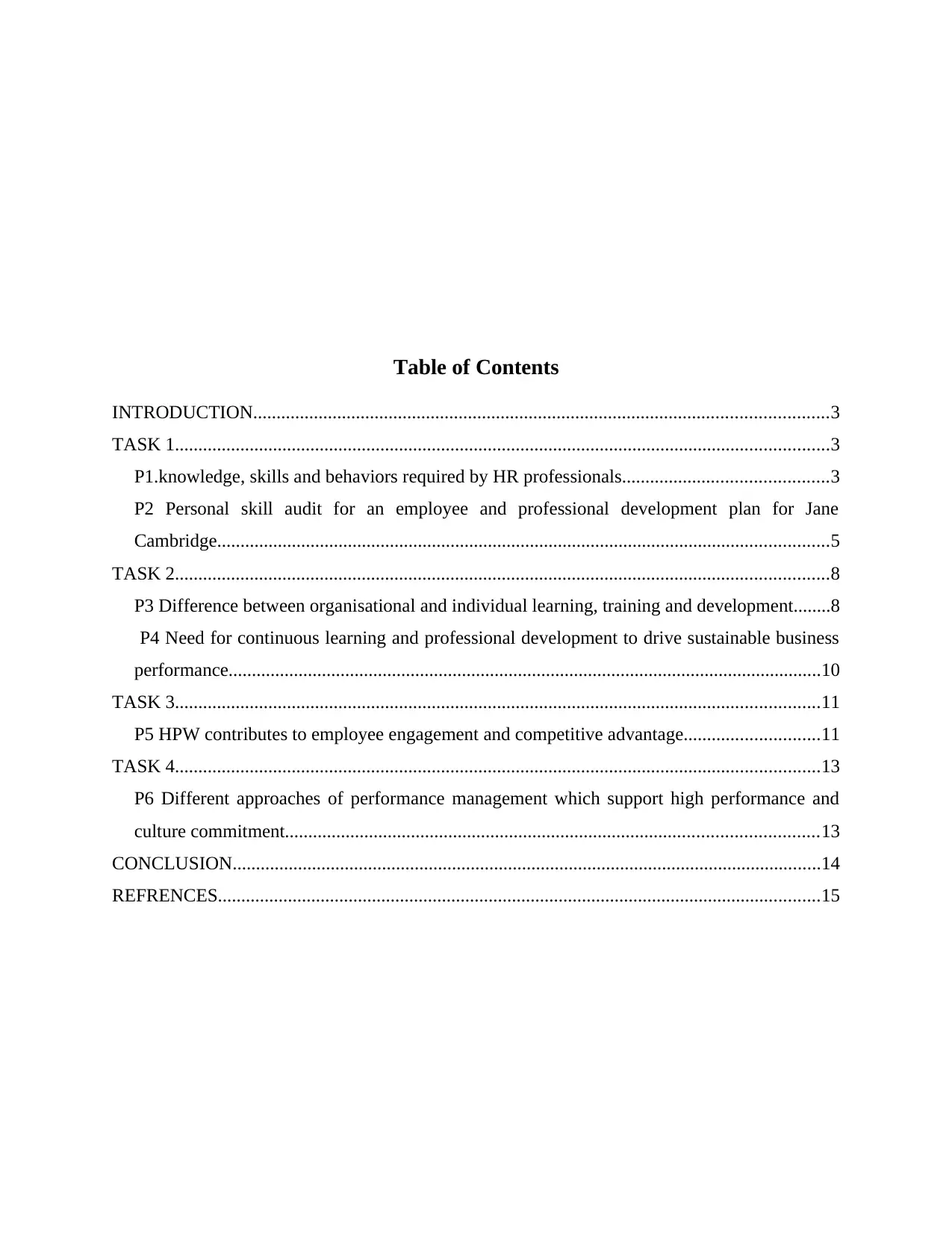
Table of Contents
INTRODUCTION...........................................................................................................................3
TASK 1............................................................................................................................................3
P1.knowledge, skills and behaviors required by HR professionals............................................3
P2 Personal skill audit for an employee and professional development plan for Jane
Cambridge...................................................................................................................................5
TASK 2............................................................................................................................................8
P3 Difference between organisational and individual learning, training and development........8
P4 Need for continuous learning and professional development to drive sustainable business
performance...............................................................................................................................10
TASK 3..........................................................................................................................................11
P5 HPW contributes to employee engagement and competitive advantage.............................11
TASK 4..........................................................................................................................................13
P6 Different approaches of performance management which support high performance and
culture commitment..................................................................................................................13
CONCLUSION..............................................................................................................................14
REFRENCES.................................................................................................................................15
INTRODUCTION...........................................................................................................................3
TASK 1............................................................................................................................................3
P1.knowledge, skills and behaviors required by HR professionals............................................3
P2 Personal skill audit for an employee and professional development plan for Jane
Cambridge...................................................................................................................................5
TASK 2............................................................................................................................................8
P3 Difference between organisational and individual learning, training and development........8
P4 Need for continuous learning and professional development to drive sustainable business
performance...............................................................................................................................10
TASK 3..........................................................................................................................................11
P5 HPW contributes to employee engagement and competitive advantage.............................11
TASK 4..........................................................................................................................................13
P6 Different approaches of performance management which support high performance and
culture commitment..................................................................................................................13
CONCLUSION..............................................................................................................................14
REFRENCES.................................................................................................................................15
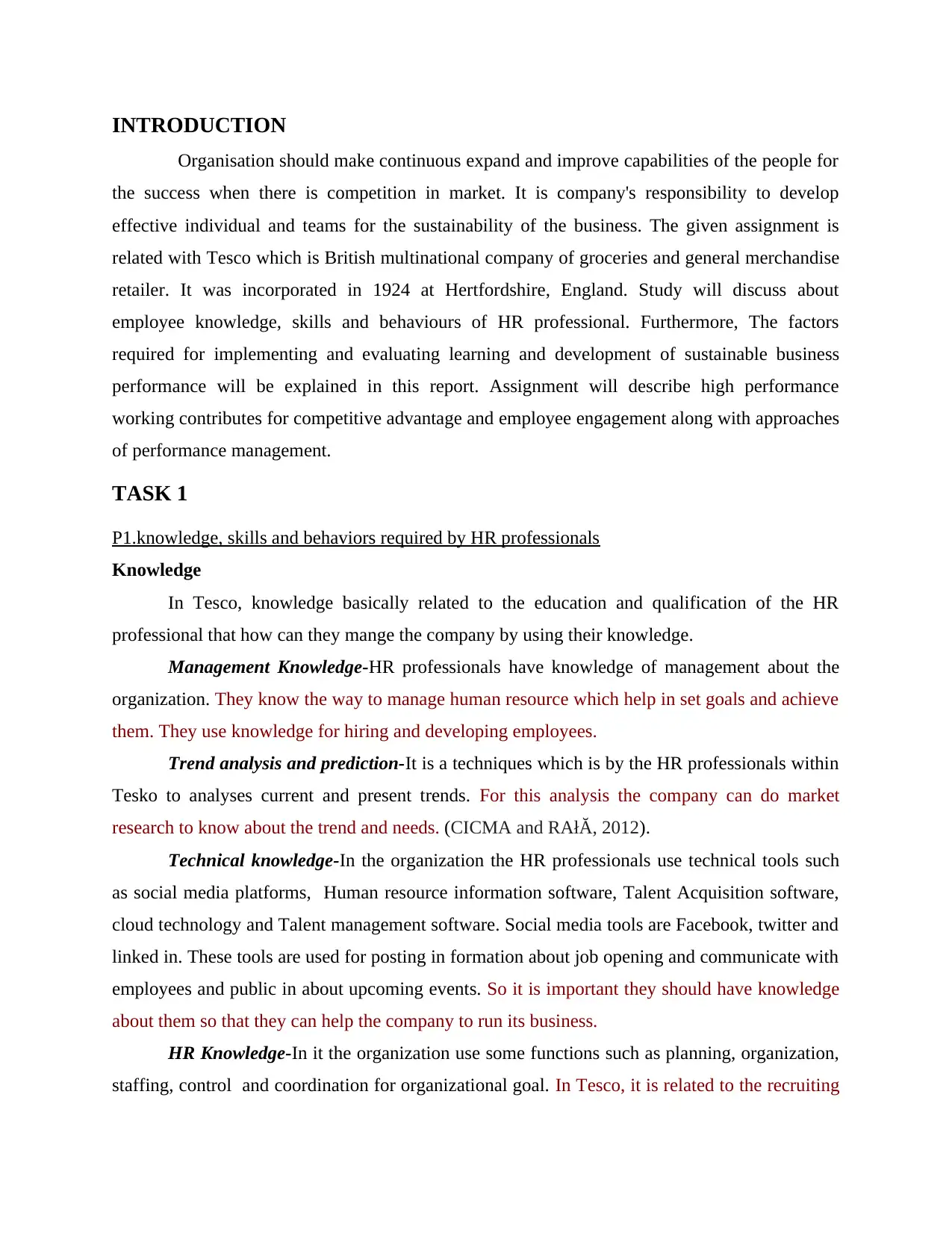
INTRODUCTION
Organisation should make continuous expand and improve capabilities of the people for
the success when there is competition in market. It is company's responsibility to develop
effective individual and teams for the sustainability of the business. The given assignment is
related with Tesco which is British multinational company of groceries and general merchandise
retailer. It was incorporated in 1924 at Hertfordshire, England. Study will discuss about
employee knowledge, skills and behaviours of HR professional. Furthermore, The factors
required for implementing and evaluating learning and development of sustainable business
performance will be explained in this report. Assignment will describe high performance
working contributes for competitive advantage and employee engagement along with approaches
of performance management.
TASK 1
P1.knowledge, skills and behaviors required by HR professionals
Knowledge
In Tesco, knowledge basically related to the education and qualification of the HR
professional that how can they mange the company by using their knowledge.
Management Knowledge-HR professionals have knowledge of management about the
organization. They know the way to manage human resource which help in set goals and achieve
them. They use knowledge for hiring and developing employees.
Trend analysis and prediction-It is a techniques which is by the HR professionals within
Tesko to analyses current and present trends. For this analysis the company can do market
research to know about the trend and needs. (CICMA and RAłĂ, 2012).
Technical knowledge-In the organization the HR professionals use technical tools such
as social media platforms, Human resource information software, Talent Acquisition software,
cloud technology and Talent management software. Social media tools are Facebook, twitter and
linked in. These tools are used for posting in formation about job opening and communicate with
employees and public in about upcoming events. So it is important they should have knowledge
about them so that they can help the company to run its business.
HR Knowledge-In it the organization use some functions such as planning, organization,
staffing, control and coordination for organizational goal. In Tesco, it is related to the recruiting
Organisation should make continuous expand and improve capabilities of the people for
the success when there is competition in market. It is company's responsibility to develop
effective individual and teams for the sustainability of the business. The given assignment is
related with Tesco which is British multinational company of groceries and general merchandise
retailer. It was incorporated in 1924 at Hertfordshire, England. Study will discuss about
employee knowledge, skills and behaviours of HR professional. Furthermore, The factors
required for implementing and evaluating learning and development of sustainable business
performance will be explained in this report. Assignment will describe high performance
working contributes for competitive advantage and employee engagement along with approaches
of performance management.
TASK 1
P1.knowledge, skills and behaviors required by HR professionals
Knowledge
In Tesco, knowledge basically related to the education and qualification of the HR
professional that how can they mange the company by using their knowledge.
Management Knowledge-HR professionals have knowledge of management about the
organization. They know the way to manage human resource which help in set goals and achieve
them. They use knowledge for hiring and developing employees.
Trend analysis and prediction-It is a techniques which is by the HR professionals within
Tesko to analyses current and present trends. For this analysis the company can do market
research to know about the trend and needs. (CICMA and RAłĂ, 2012).
Technical knowledge-In the organization the HR professionals use technical tools such
as social media platforms, Human resource information software, Talent Acquisition software,
cloud technology and Talent management software. Social media tools are Facebook, twitter and
linked in. These tools are used for posting in formation about job opening and communicate with
employees and public in about upcoming events. So it is important they should have knowledge
about them so that they can help the company to run its business.
HR Knowledge-In it the organization use some functions such as planning, organization,
staffing, control and coordination for organizational goal. In Tesco, it is related to the recruiting
⊘ This is a preview!⊘
Do you want full access?
Subscribe today to unlock all pages.

Trusted by 1+ million students worldwide
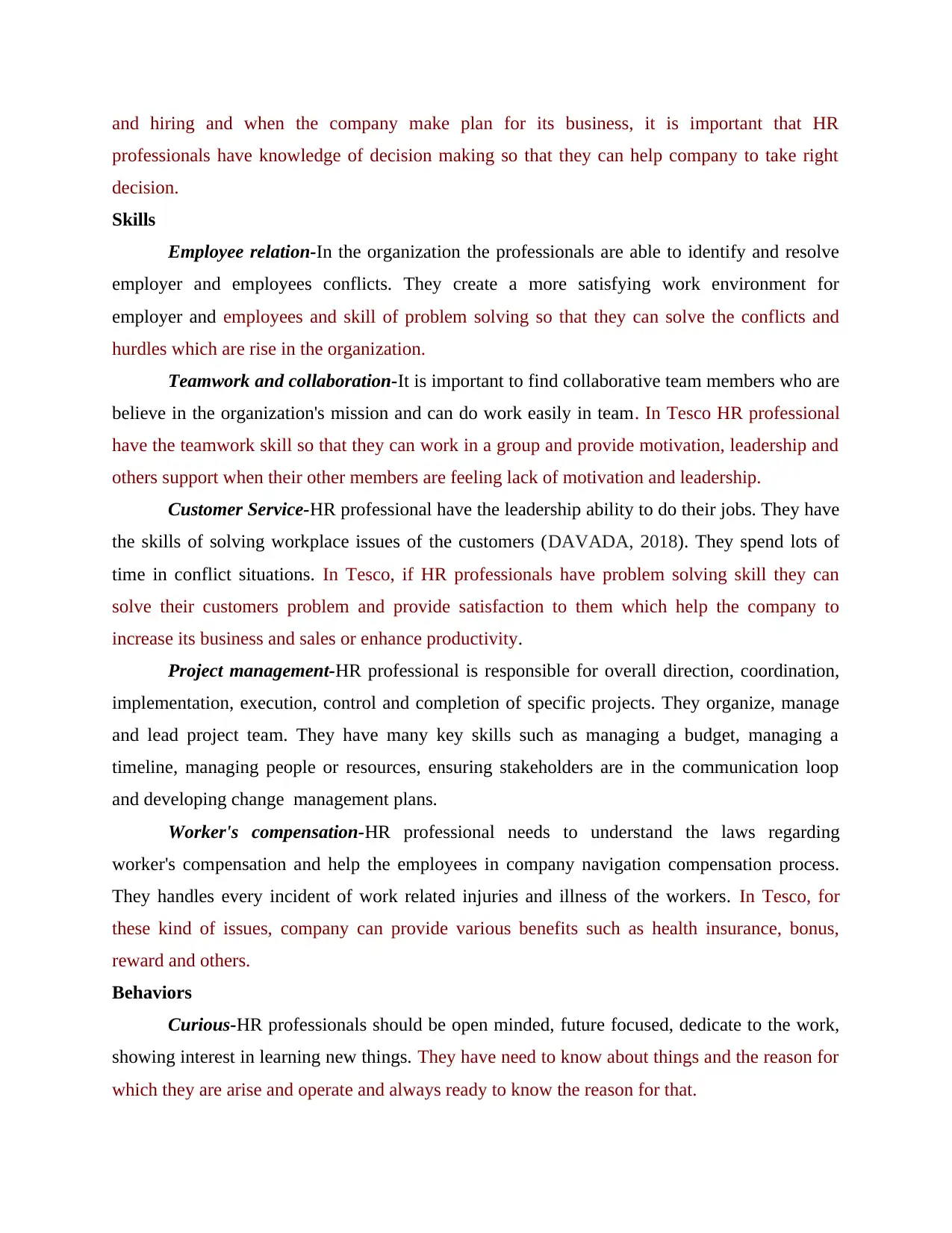
and hiring and when the company make plan for its business, it is important that HR
professionals have knowledge of decision making so that they can help company to take right
decision.
Skills
Employee relation-In the organization the professionals are able to identify and resolve
employer and employees conflicts. They create a more satisfying work environment for
employer and employees and skill of problem solving so that they can solve the conflicts and
hurdles which are rise in the organization.
Teamwork and collaboration-It is important to find collaborative team members who are
believe in the organization's mission and can do work easily in team. In Tesco HR professional
have the teamwork skill so that they can work in a group and provide motivation, leadership and
others support when their other members are feeling lack of motivation and leadership.
Customer Service-HR professional have the leadership ability to do their jobs. They have
the skills of solving workplace issues of the customers (DAVADA, 2018). They spend lots of
time in conflict situations. In Tesco, if HR professionals have problem solving skill they can
solve their customers problem and provide satisfaction to them which help the company to
increase its business and sales or enhance productivity.
Project management-HR professional is responsible for overall direction, coordination,
implementation, execution, control and completion of specific projects. They organize, manage
and lead project team. They have many key skills such as managing a budget, managing a
timeline, managing people or resources, ensuring stakeholders are in the communication loop
and developing change management plans.
Worker's compensation-HR professional needs to understand the laws regarding
worker's compensation and help the employees in company navigation compensation process.
They handles every incident of work related injuries and illness of the workers. In Tesco, for
these kind of issues, company can provide various benefits such as health insurance, bonus,
reward and others.
Behaviors
Curious-HR professionals should be open minded, future focused, dedicate to the work,
showing interest in learning new things. They have need to know about things and the reason for
which they are arise and operate and always ready to know the reason for that.
professionals have knowledge of decision making so that they can help company to take right
decision.
Skills
Employee relation-In the organization the professionals are able to identify and resolve
employer and employees conflicts. They create a more satisfying work environment for
employer and employees and skill of problem solving so that they can solve the conflicts and
hurdles which are rise in the organization.
Teamwork and collaboration-It is important to find collaborative team members who are
believe in the organization's mission and can do work easily in team. In Tesco HR professional
have the teamwork skill so that they can work in a group and provide motivation, leadership and
others support when their other members are feeling lack of motivation and leadership.
Customer Service-HR professional have the leadership ability to do their jobs. They have
the skills of solving workplace issues of the customers (DAVADA, 2018). They spend lots of
time in conflict situations. In Tesco, if HR professionals have problem solving skill they can
solve their customers problem and provide satisfaction to them which help the company to
increase its business and sales or enhance productivity.
Project management-HR professional is responsible for overall direction, coordination,
implementation, execution, control and completion of specific projects. They organize, manage
and lead project team. They have many key skills such as managing a budget, managing a
timeline, managing people or resources, ensuring stakeholders are in the communication loop
and developing change management plans.
Worker's compensation-HR professional needs to understand the laws regarding
worker's compensation and help the employees in company navigation compensation process.
They handles every incident of work related injuries and illness of the workers. In Tesco, for
these kind of issues, company can provide various benefits such as health insurance, bonus,
reward and others.
Behaviors
Curious-HR professionals should be open minded, future focused, dedicate to the work,
showing interest in learning new things. They have need to know about things and the reason for
which they are arise and operate and always ready to know the reason for that.
Paraphrase This Document
Need a fresh take? Get an instant paraphrase of this document with our AI Paraphraser
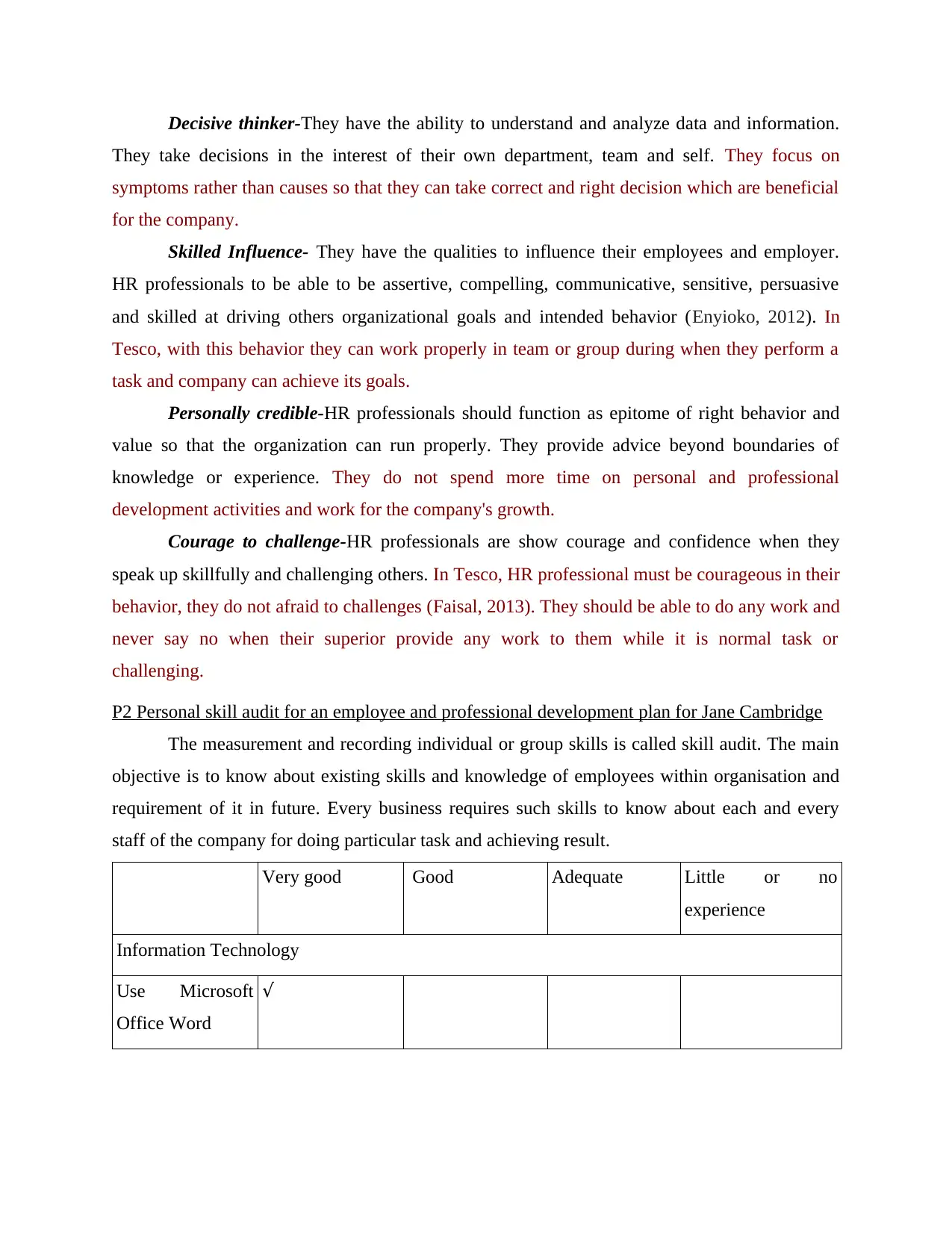
Decisive thinker-They have the ability to understand and analyze data and information.
They take decisions in the interest of their own department, team and self. They focus on
symptoms rather than causes so that they can take correct and right decision which are beneficial
for the company.
Skilled Influence- They have the qualities to influence their employees and employer.
HR professionals to be able to be assertive, compelling, communicative, sensitive, persuasive
and skilled at driving others organizational goals and intended behavior (Enyioko, 2012). In
Tesco, with this behavior they can work properly in team or group during when they perform a
task and company can achieve its goals.
Personally credible-HR professionals should function as epitome of right behavior and
value so that the organization can run properly. They provide advice beyond boundaries of
knowledge or experience. They do not spend more time on personal and professional
development activities and work for the company's growth.
Courage to challenge-HR professionals are show courage and confidence when they
speak up skillfully and challenging others. In Tesco, HR professional must be courageous in their
behavior, they do not afraid to challenges (Faisal, 2013). They should be able to do any work and
never say no when their superior provide any work to them while it is normal task or
challenging.
P2 Personal skill audit for an employee and professional development plan for Jane Cambridge
The measurement and recording individual or group skills is called skill audit. The main
objective is to know about existing skills and knowledge of employees within organisation and
requirement of it in future. Every business requires such skills to know about each and every
staff of the company for doing particular task and achieving result.
Very good Good Adequate Little or no
experience
Information Technology
Use Microsoft
Office Word
√
They take decisions in the interest of their own department, team and self. They focus on
symptoms rather than causes so that they can take correct and right decision which are beneficial
for the company.
Skilled Influence- They have the qualities to influence their employees and employer.
HR professionals to be able to be assertive, compelling, communicative, sensitive, persuasive
and skilled at driving others organizational goals and intended behavior (Enyioko, 2012). In
Tesco, with this behavior they can work properly in team or group during when they perform a
task and company can achieve its goals.
Personally credible-HR professionals should function as epitome of right behavior and
value so that the organization can run properly. They provide advice beyond boundaries of
knowledge or experience. They do not spend more time on personal and professional
development activities and work for the company's growth.
Courage to challenge-HR professionals are show courage and confidence when they
speak up skillfully and challenging others. In Tesco, HR professional must be courageous in their
behavior, they do not afraid to challenges (Faisal, 2013). They should be able to do any work and
never say no when their superior provide any work to them while it is normal task or
challenging.
P2 Personal skill audit for an employee and professional development plan for Jane Cambridge
The measurement and recording individual or group skills is called skill audit. The main
objective is to know about existing skills and knowledge of employees within organisation and
requirement of it in future. Every business requires such skills to know about each and every
staff of the company for doing particular task and achieving result.
Very good Good Adequate Little or no
experience
Information Technology
Use Microsoft
Office Word
√
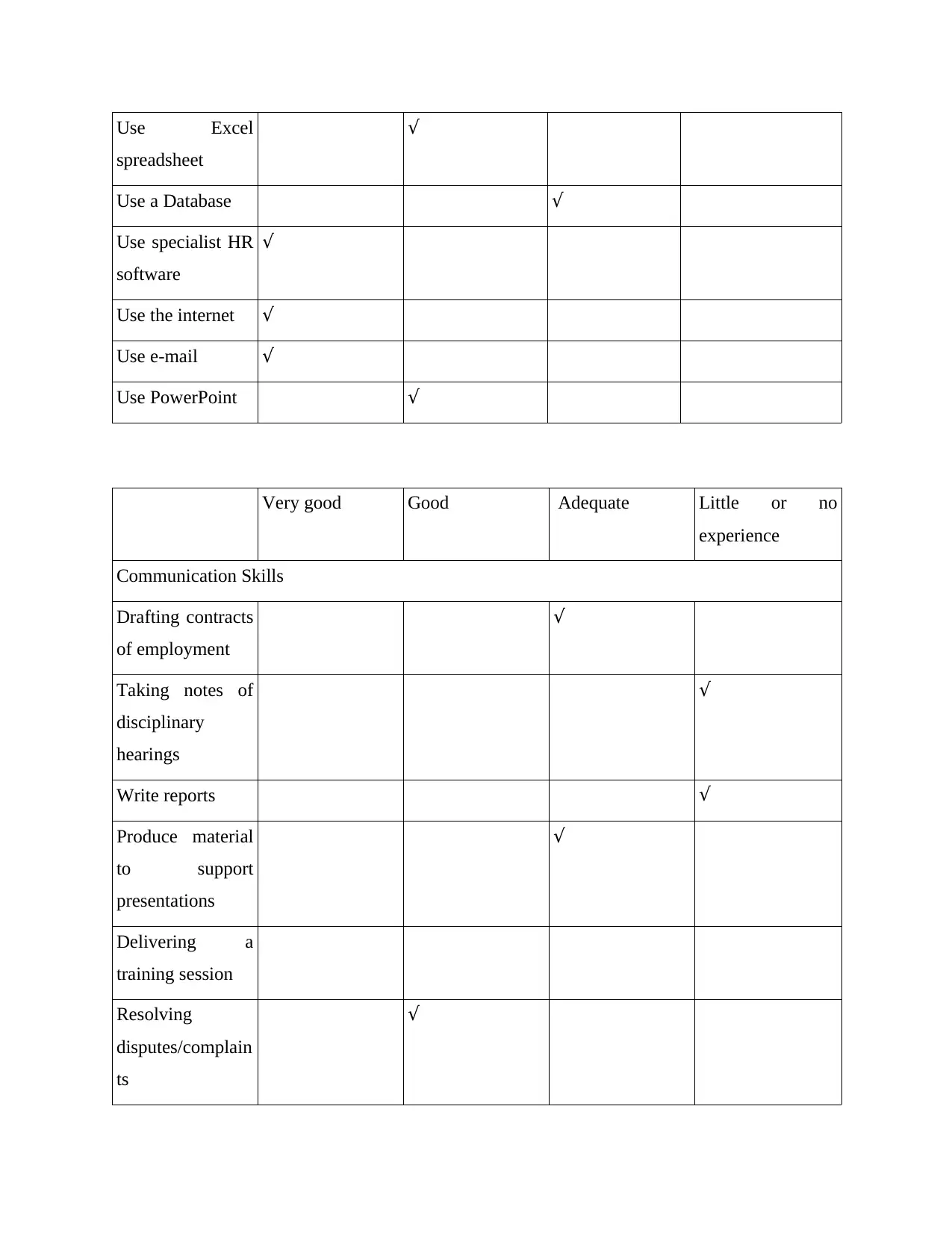
Use Excel
spreadsheet
√
Use a Database √
Use specialist HR
software
√
Use the internet √
Use e-mail √
Use PowerPoint √
Very good Good Adequate Little or no
experience
Communication Skills
Drafting contracts
of employment
√
Taking notes of
disciplinary
hearings
√
Write reports √
Produce material
to support
presentations
√
Delivering a
training session
Resolving
disputes/complain
ts
√
spreadsheet
√
Use a Database √
Use specialist HR
software
√
Use the internet √
Use e-mail √
Use PowerPoint √
Very good Good Adequate Little or no
experience
Communication Skills
Drafting contracts
of employment
√
Taking notes of
disciplinary
hearings
√
Write reports √
Produce material
to support
presentations
√
Delivering a
training session
Resolving
disputes/complain
ts
√
⊘ This is a preview!⊘
Do you want full access?
Subscribe today to unlock all pages.

Trusted by 1+ million students worldwide
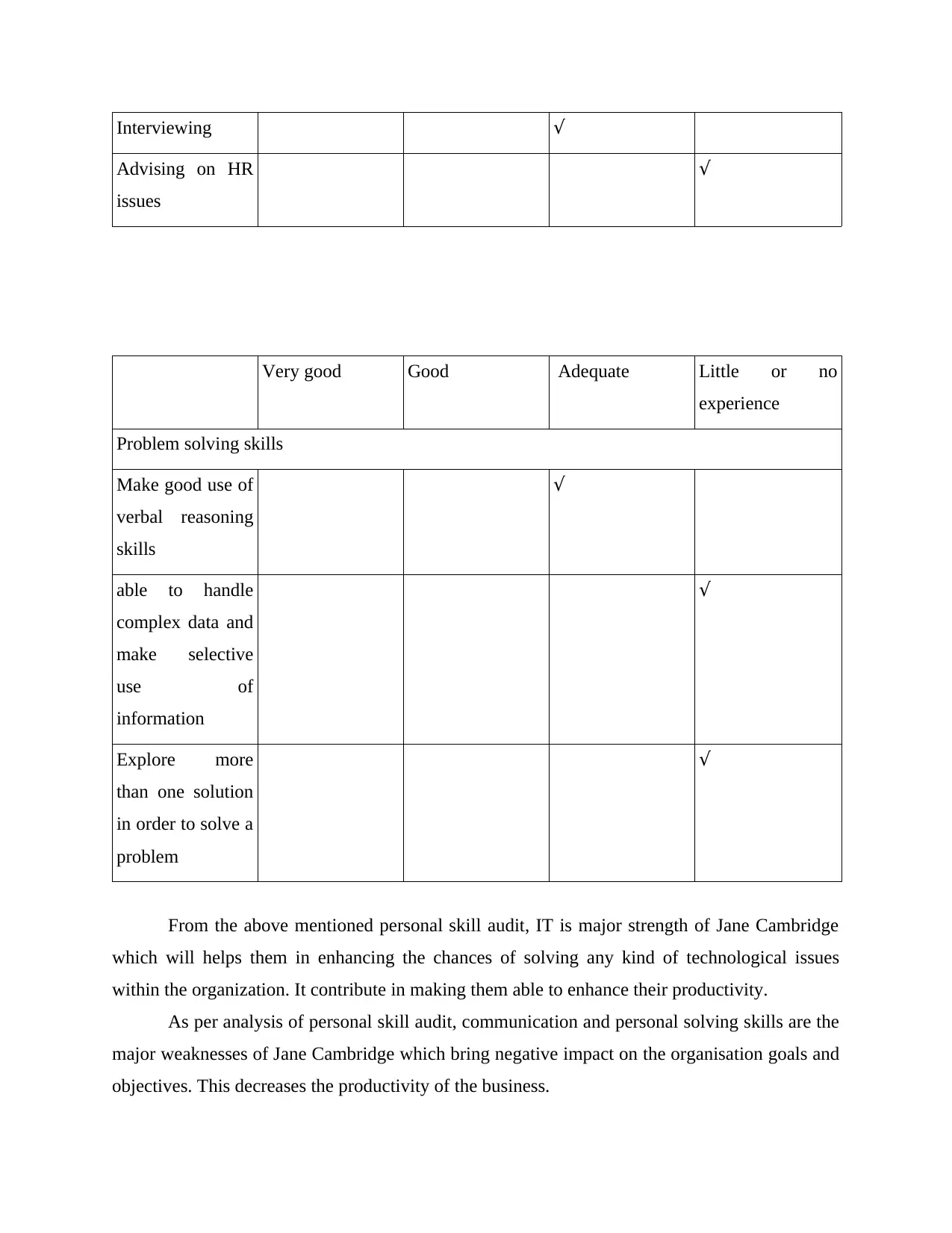
Interviewing √
Advising on HR
issues
√
Very good Good Adequate Little or no
experience
Problem solving skills
Make good use of
verbal reasoning
skills
√
able to handle
complex data and
make selective
use of
information
√
Explore more
than one solution
in order to solve a
problem
√
From the above mentioned personal skill audit, IT is major strength of Jane Cambridge
which will helps them in enhancing the chances of solving any kind of technological issues
within the organization. It contribute in making them able to enhance their productivity.
As per analysis of personal skill audit, communication and personal solving skills are the
major weaknesses of Jane Cambridge which bring negative impact on the organisation goals and
objectives. This decreases the productivity of the business.
Advising on HR
issues
√
Very good Good Adequate Little or no
experience
Problem solving skills
Make good use of
verbal reasoning
skills
√
able to handle
complex data and
make selective
use of
information
√
Explore more
than one solution
in order to solve a
problem
√
From the above mentioned personal skill audit, IT is major strength of Jane Cambridge
which will helps them in enhancing the chances of solving any kind of technological issues
within the organization. It contribute in making them able to enhance their productivity.
As per analysis of personal skill audit, communication and personal solving skills are the
major weaknesses of Jane Cambridge which bring negative impact on the organisation goals and
objectives. This decreases the productivity of the business.
Paraphrase This Document
Need a fresh take? Get an instant paraphrase of this document with our AI Paraphraser
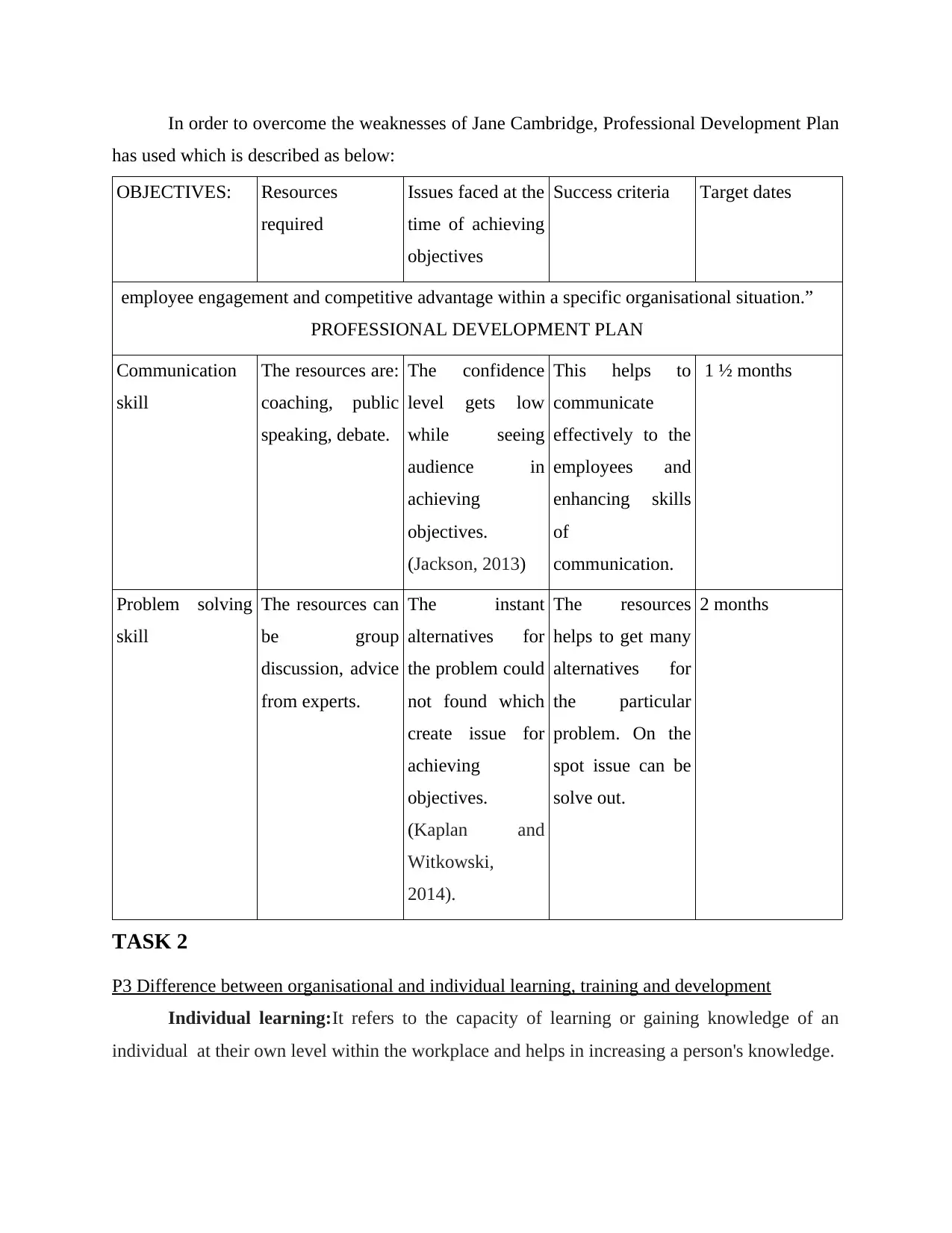
In order to overcome the weaknesses of Jane Cambridge, Professional Development Plan
has used which is described as below:
OBJECTIVES: Resources
required
Issues faced at the
time of achieving
objectives
Success criteria Target dates
employee engagement and competitive advantage within a specific organisational situation.”
PROFESSIONAL DEVELOPMENT PLAN
Communication
skill
The resources are:
coaching, public
speaking, debate.
The confidence
level gets low
while seeing
audience in
achieving
objectives.
(Jackson, 2013)
This helps to
communicate
effectively to the
employees and
enhancing skills
of
communication.
1 ½ months
Problem solving
skill
The resources can
be group
discussion, advice
from experts.
The instant
alternatives for
the problem could
not found which
create issue for
achieving
objectives.
(Kaplan and
Witkowski,
2014).
The resources
helps to get many
alternatives for
the particular
problem. On the
spot issue can be
solve out.
2 months
TASK 2
P3 Difference between organisational and individual learning, training and development
Individual learning:It refers to the capacity of learning or gaining knowledge of an
individual at their own level within the workplace and helps in increasing a person's knowledge.
has used which is described as below:
OBJECTIVES: Resources
required
Issues faced at the
time of achieving
objectives
Success criteria Target dates
employee engagement and competitive advantage within a specific organisational situation.”
PROFESSIONAL DEVELOPMENT PLAN
Communication
skill
The resources are:
coaching, public
speaking, debate.
The confidence
level gets low
while seeing
audience in
achieving
objectives.
(Jackson, 2013)
This helps to
communicate
effectively to the
employees and
enhancing skills
of
communication.
1 ½ months
Problem solving
skill
The resources can
be group
discussion, advice
from experts.
The instant
alternatives for
the problem could
not found which
create issue for
achieving
objectives.
(Kaplan and
Witkowski,
2014).
The resources
helps to get many
alternatives for
the particular
problem. On the
spot issue can be
solve out.
2 months
TASK 2
P3 Difference between organisational and individual learning, training and development
Individual learning:It refers to the capacity of learning or gaining knowledge of an
individual at their own level within the workplace and helps in increasing a person's knowledge.
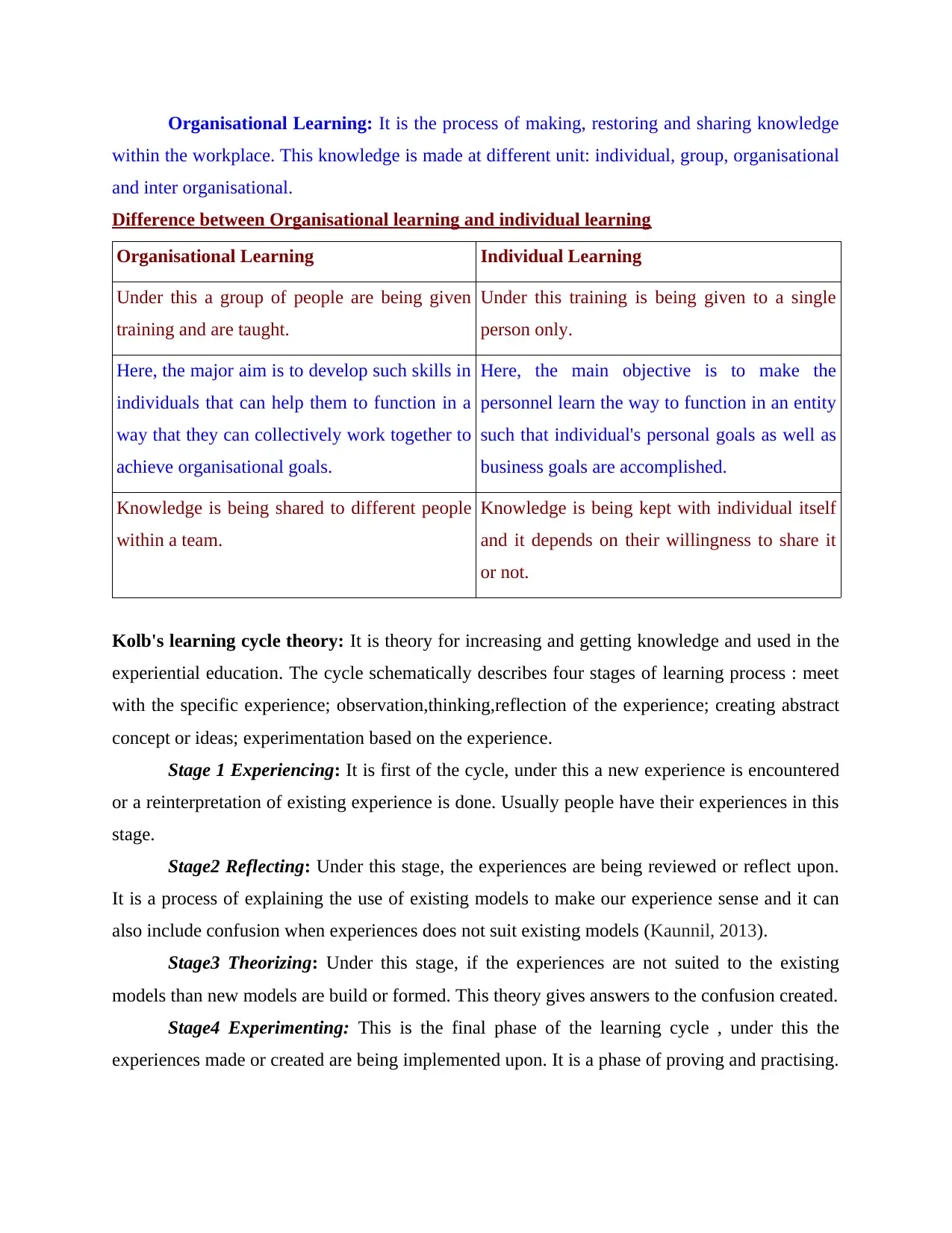
Organisational Learning: It is the process of making, restoring and sharing knowledge
within the workplace. This knowledge is made at different unit: individual, group, organisational
and inter organisational.
Difference between Organisational learning and individual learning
Organisational Learning Individual Learning
Under this a group of people are being given
training and are taught.
Under this training is being given to a single
person only.
Here, the major aim is to develop such skills in
individuals that can help them to function in a
way that they can collectively work together to
achieve organisational goals.
Here, the main objective is to make the
personnel learn the way to function in an entity
such that individual's personal goals as well as
business goals are accomplished.
Knowledge is being shared to different people
within a team.
Knowledge is being kept with individual itself
and it depends on their willingness to share it
or not.
Kolb's learning cycle theory: It is theory for increasing and getting knowledge and used in the
experiential education. The cycle schematically describes four stages of learning process : meet
with the specific experience; observation,thinking,reflection of the experience; creating abstract
concept or ideas; experimentation based on the experience.
Stage 1 Experiencing: It is first of the cycle, under this a new experience is encountered
or a reinterpretation of existing experience is done. Usually people have their experiences in this
stage.
Stage2 Reflecting: Under this stage, the experiences are being reviewed or reflect upon.
It is a process of explaining the use of existing models to make our experience sense and it can
also include confusion when experiences does not suit existing models (Kaunnil, 2013).
Stage3 Theorizing: Under this stage, if the experiences are not suited to the existing
models than new models are build or formed. This theory gives answers to the confusion created.
Stage4 Experimenting: This is the final phase of the learning cycle , under this the
experiences made or created are being implemented upon. It is a phase of proving and practising.
within the workplace. This knowledge is made at different unit: individual, group, organisational
and inter organisational.
Difference between Organisational learning and individual learning
Organisational Learning Individual Learning
Under this a group of people are being given
training and are taught.
Under this training is being given to a single
person only.
Here, the major aim is to develop such skills in
individuals that can help them to function in a
way that they can collectively work together to
achieve organisational goals.
Here, the main objective is to make the
personnel learn the way to function in an entity
such that individual's personal goals as well as
business goals are accomplished.
Knowledge is being shared to different people
within a team.
Knowledge is being kept with individual itself
and it depends on their willingness to share it
or not.
Kolb's learning cycle theory: It is theory for increasing and getting knowledge and used in the
experiential education. The cycle schematically describes four stages of learning process : meet
with the specific experience; observation,thinking,reflection of the experience; creating abstract
concept or ideas; experimentation based on the experience.
Stage 1 Experiencing: It is first of the cycle, under this a new experience is encountered
or a reinterpretation of existing experience is done. Usually people have their experiences in this
stage.
Stage2 Reflecting: Under this stage, the experiences are being reviewed or reflect upon.
It is a process of explaining the use of existing models to make our experience sense and it can
also include confusion when experiences does not suit existing models (Kaunnil, 2013).
Stage3 Theorizing: Under this stage, if the experiences are not suited to the existing
models than new models are build or formed. This theory gives answers to the confusion created.
Stage4 Experimenting: This is the final phase of the learning cycle , under this the
experiences made or created are being implemented upon. It is a phase of proving and practising.
⊘ This is a preview!⊘
Do you want full access?
Subscribe today to unlock all pages.

Trusted by 1+ million students worldwide
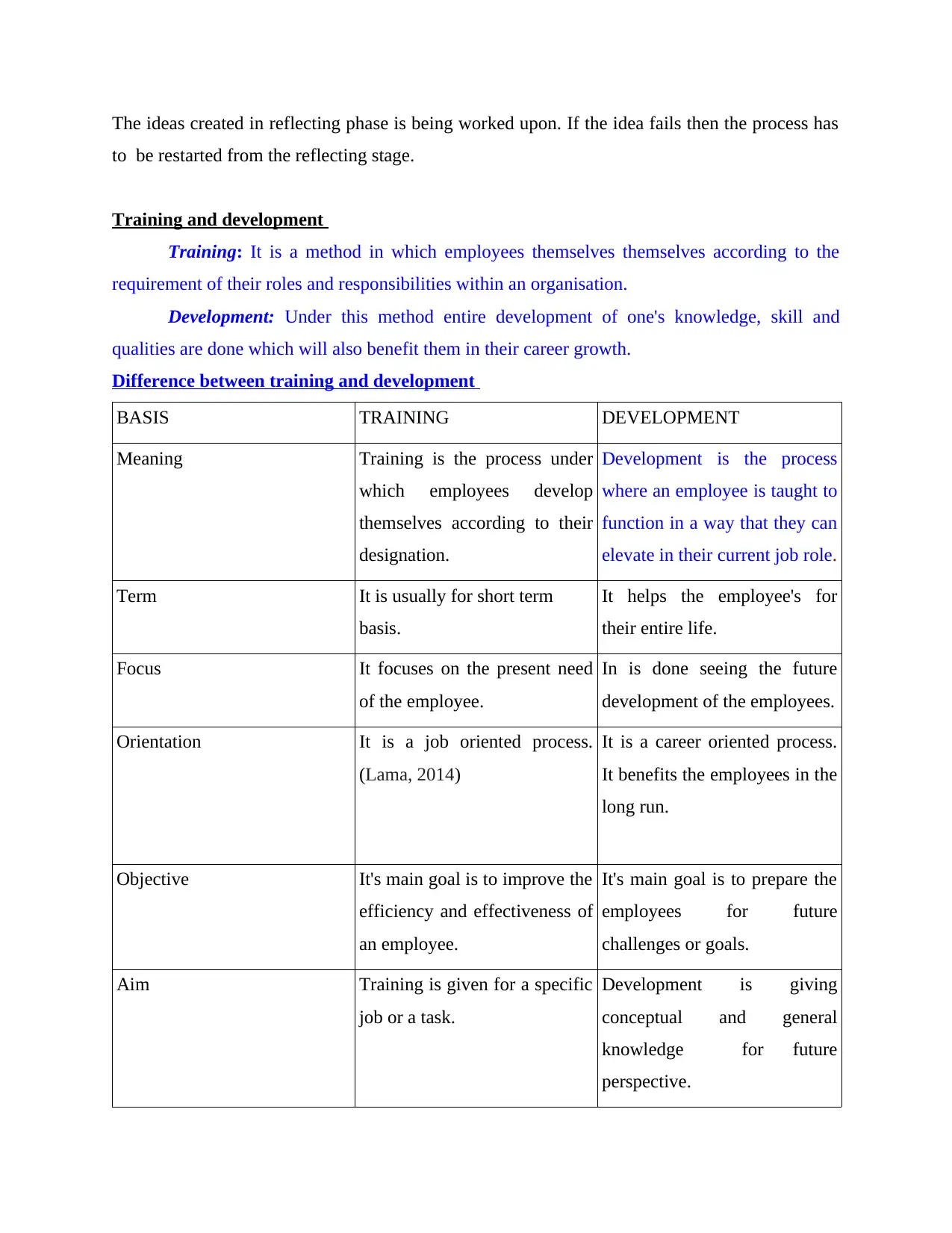
The ideas created in reflecting phase is being worked upon. If the idea fails then the process has
to be restarted from the reflecting stage.
Training and development
Training: It is a method in which employees themselves themselves according to the
requirement of their roles and responsibilities within an organisation.
Development: Under this method entire development of one's knowledge, skill and
qualities are done which will also benefit them in their career growth.
Difference between training and development
BASIS TRAINING DEVELOPMENT
Meaning Training is the process under
which employees develop
themselves according to their
designation.
Development is the process
where an employee is taught to
function in a way that they can
elevate in their current job role.
Term It is usually for short term
basis.
It helps the employee's for
their entire life.
Focus It focuses on the present need
of the employee.
In is done seeing the future
development of the employees.
Orientation It is a job oriented process.
(Lama, 2014)
It is a career oriented process.
It benefits the employees in the
long run.
Objective It's main goal is to improve the
efficiency and effectiveness of
an employee.
It's main goal is to prepare the
employees for future
challenges or goals.
Aim Training is given for a specific
job or a task.
Development is giving
conceptual and general
knowledge for future
perspective.
to be restarted from the reflecting stage.
Training and development
Training: It is a method in which employees themselves themselves according to the
requirement of their roles and responsibilities within an organisation.
Development: Under this method entire development of one's knowledge, skill and
qualities are done which will also benefit them in their career growth.
Difference between training and development
BASIS TRAINING DEVELOPMENT
Meaning Training is the process under
which employees develop
themselves according to their
designation.
Development is the process
where an employee is taught to
function in a way that they can
elevate in their current job role.
Term It is usually for short term
basis.
It helps the employee's for
their entire life.
Focus It focuses on the present need
of the employee.
In is done seeing the future
development of the employees.
Orientation It is a job oriented process.
(Lama, 2014)
It is a career oriented process.
It benefits the employees in the
long run.
Objective It's main goal is to improve the
efficiency and effectiveness of
an employee.
It's main goal is to prepare the
employees for future
challenges or goals.
Aim Training is given for a specific
job or a task.
Development is giving
conceptual and general
knowledge for future
perspective.
Paraphrase This Document
Need a fresh take? Get an instant paraphrase of this document with our AI Paraphraser
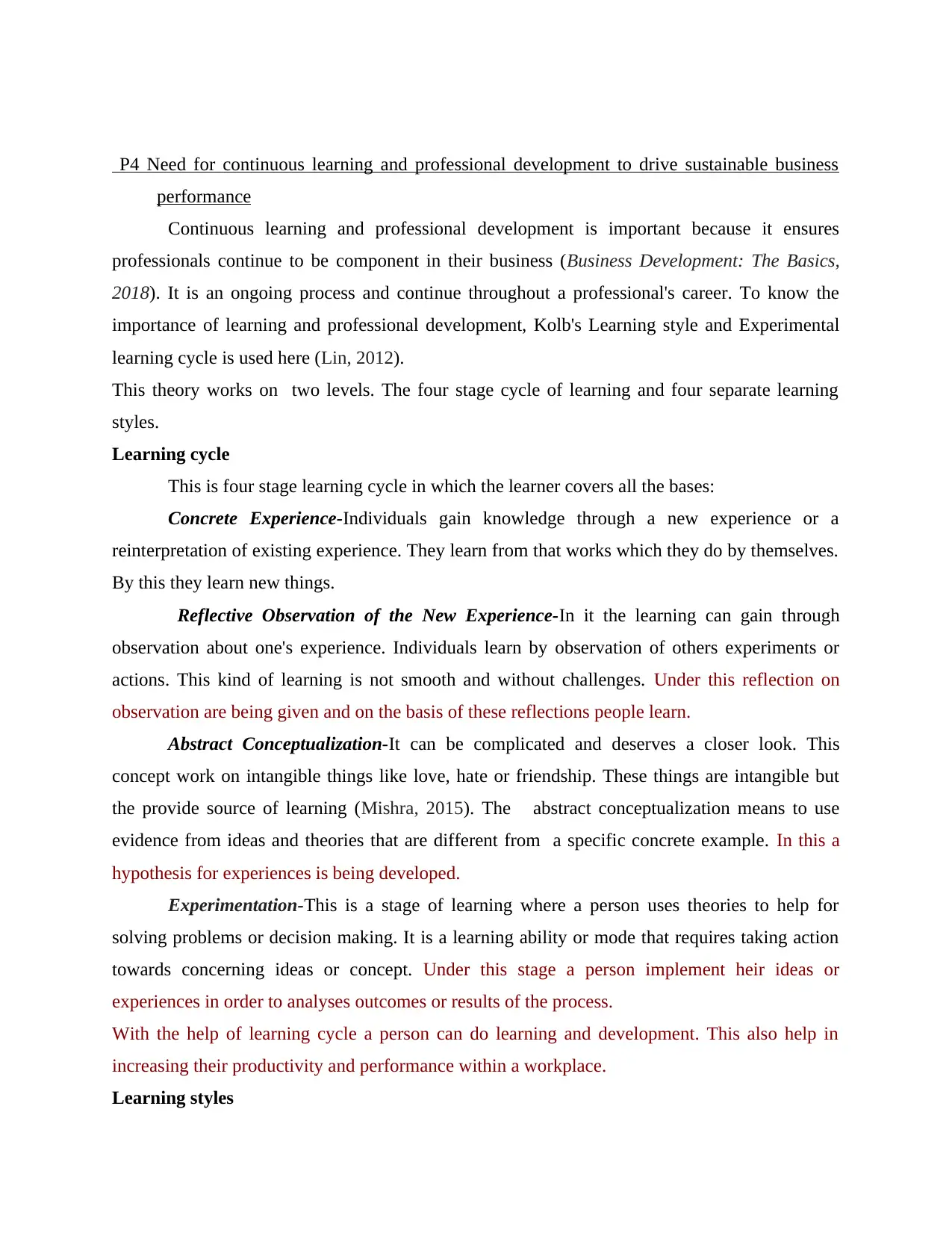
P4 Need for continuous learning and professional development to drive sustainable business
performance
Continuous learning and professional development is important because it ensures
professionals continue to be component in their business (Business Development: The Basics,
2018). It is an ongoing process and continue throughout a professional's career. To know the
importance of learning and professional development, Kolb's Learning style and Experimental
learning cycle is used here (Lin, 2012).
This theory works on two levels. The four stage cycle of learning and four separate learning
styles.
Learning cycle
This is four stage learning cycle in which the learner covers all the bases:
Concrete Experience-Individuals gain knowledge through a new experience or a
reinterpretation of existing experience. They learn from that works which they do by themselves.
By this they learn new things.
Reflective Observation of the New Experience-In it the learning can gain through
observation about one's experience. Individuals learn by observation of others experiments or
actions. This kind of learning is not smooth and without challenges. Under this reflection on
observation are being given and on the basis of these reflections people learn.
Abstract Conceptualization-It can be complicated and deserves a closer look. This
concept work on intangible things like love, hate or friendship. These things are intangible but
the provide source of learning (Mishra, 2015). The abstract conceptualization means to use
evidence from ideas and theories that are different from a specific concrete example. In this a
hypothesis for experiences is being developed.
Experimentation-This is a stage of learning where a person uses theories to help for
solving problems or decision making. It is a learning ability or mode that requires taking action
towards concerning ideas or concept. Under this stage a person implement heir ideas or
experiences in order to analyses outcomes or results of the process.
With the help of learning cycle a person can do learning and development. This also help in
increasing their productivity and performance within a workplace.
Learning styles
performance
Continuous learning and professional development is important because it ensures
professionals continue to be component in their business (Business Development: The Basics,
2018). It is an ongoing process and continue throughout a professional's career. To know the
importance of learning and professional development, Kolb's Learning style and Experimental
learning cycle is used here (Lin, 2012).
This theory works on two levels. The four stage cycle of learning and four separate learning
styles.
Learning cycle
This is four stage learning cycle in which the learner covers all the bases:
Concrete Experience-Individuals gain knowledge through a new experience or a
reinterpretation of existing experience. They learn from that works which they do by themselves.
By this they learn new things.
Reflective Observation of the New Experience-In it the learning can gain through
observation about one's experience. Individuals learn by observation of others experiments or
actions. This kind of learning is not smooth and without challenges. Under this reflection on
observation are being given and on the basis of these reflections people learn.
Abstract Conceptualization-It can be complicated and deserves a closer look. This
concept work on intangible things like love, hate or friendship. These things are intangible but
the provide source of learning (Mishra, 2015). The abstract conceptualization means to use
evidence from ideas and theories that are different from a specific concrete example. In this a
hypothesis for experiences is being developed.
Experimentation-This is a stage of learning where a person uses theories to help for
solving problems or decision making. It is a learning ability or mode that requires taking action
towards concerning ideas or concept. Under this stage a person implement heir ideas or
experiences in order to analyses outcomes or results of the process.
With the help of learning cycle a person can do learning and development. This also help in
increasing their productivity and performance within a workplace.
Learning styles
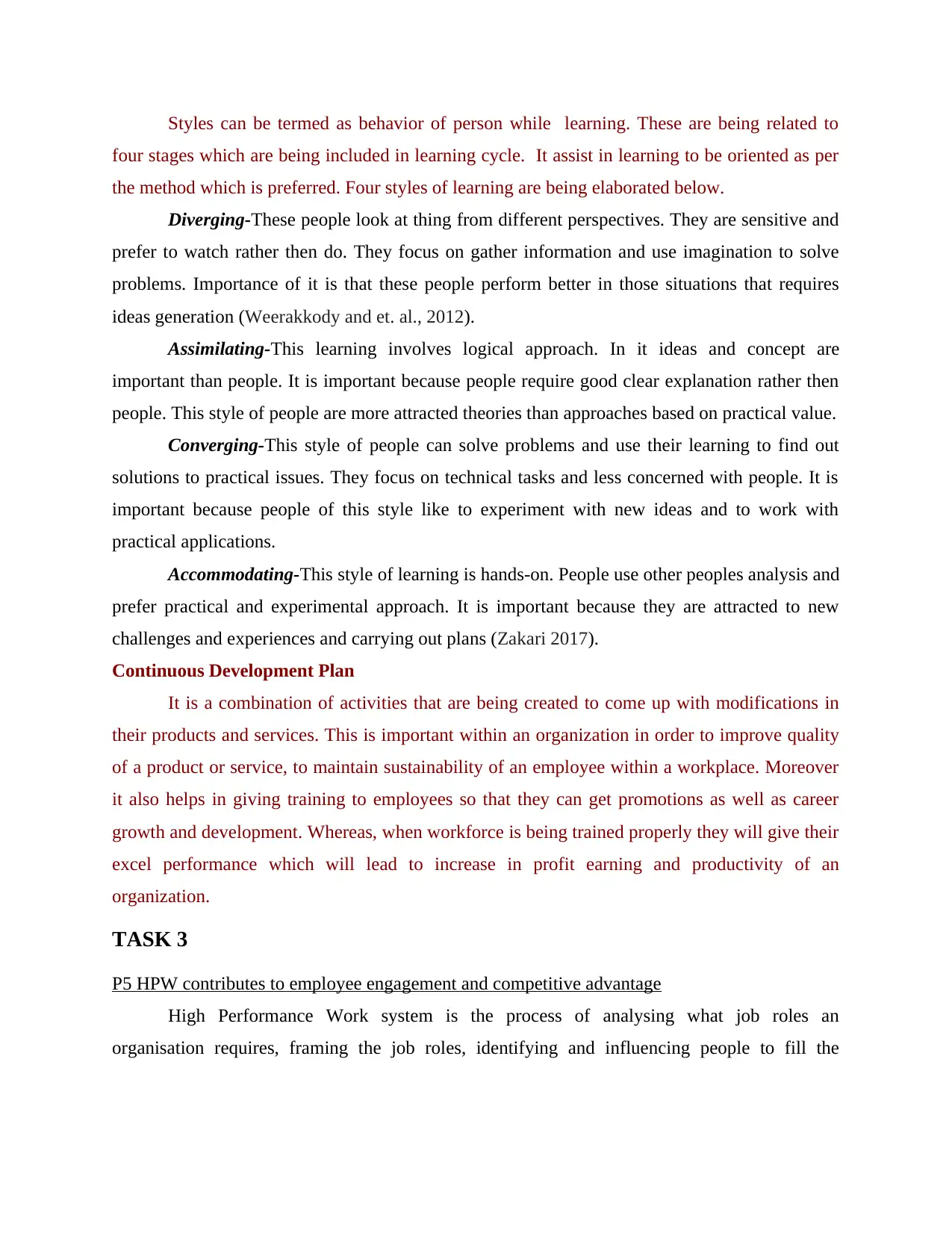
Styles can be termed as behavior of person while learning. These are being related to
four stages which are being included in learning cycle. It assist in learning to be oriented as per
the method which is preferred. Four styles of learning are being elaborated below.
Diverging-These people look at thing from different perspectives. They are sensitive and
prefer to watch rather then do. They focus on gather information and use imagination to solve
problems. Importance of it is that these people perform better in those situations that requires
ideas generation (Weerakkody and et. al., 2012).
Assimilating-This learning involves logical approach. In it ideas and concept are
important than people. It is important because people require good clear explanation rather then
people. This style of people are more attracted theories than approaches based on practical value.
Converging-This style of people can solve problems and use their learning to find out
solutions to practical issues. They focus on technical tasks and less concerned with people. It is
important because people of this style like to experiment with new ideas and to work with
practical applications.
Accommodating-This style of learning is hands-on. People use other peoples analysis and
prefer practical and experimental approach. It is important because they are attracted to new
challenges and experiences and carrying out plans (Zakari 2017).
Continuous Development Plan
It is a combination of activities that are being created to come up with modifications in
their products and services. This is important within an organization in order to improve quality
of a product or service, to maintain sustainability of an employee within a workplace. Moreover
it also helps in giving training to employees so that they can get promotions as well as career
growth and development. Whereas, when workforce is being trained properly they will give their
excel performance which will lead to increase in profit earning and productivity of an
organization.
TASK 3
P5 HPW contributes to employee engagement and competitive advantage
High Performance Work system is the process of analysing what job roles an
organisation requires, framing the job roles, identifying and influencing people to fill the
four stages which are being included in learning cycle. It assist in learning to be oriented as per
the method which is preferred. Four styles of learning are being elaborated below.
Diverging-These people look at thing from different perspectives. They are sensitive and
prefer to watch rather then do. They focus on gather information and use imagination to solve
problems. Importance of it is that these people perform better in those situations that requires
ideas generation (Weerakkody and et. al., 2012).
Assimilating-This learning involves logical approach. In it ideas and concept are
important than people. It is important because people require good clear explanation rather then
people. This style of people are more attracted theories than approaches based on practical value.
Converging-This style of people can solve problems and use their learning to find out
solutions to practical issues. They focus on technical tasks and less concerned with people. It is
important because people of this style like to experiment with new ideas and to work with
practical applications.
Accommodating-This style of learning is hands-on. People use other peoples analysis and
prefer practical and experimental approach. It is important because they are attracted to new
challenges and experiences and carrying out plans (Zakari 2017).
Continuous Development Plan
It is a combination of activities that are being created to come up with modifications in
their products and services. This is important within an organization in order to improve quality
of a product or service, to maintain sustainability of an employee within a workplace. Moreover
it also helps in giving training to employees so that they can get promotions as well as career
growth and development. Whereas, when workforce is being trained properly they will give their
excel performance which will lead to increase in profit earning and productivity of an
organization.
TASK 3
P5 HPW contributes to employee engagement and competitive advantage
High Performance Work system is the process of analysing what job roles an
organisation requires, framing the job roles, identifying and influencing people to fill the
⊘ This is a preview!⊘
Do you want full access?
Subscribe today to unlock all pages.

Trusted by 1+ million students worldwide
1 out of 18
Related Documents
Your All-in-One AI-Powered Toolkit for Academic Success.
+13062052269
info@desklib.com
Available 24*7 on WhatsApp / Email
![[object Object]](/_next/static/media/star-bottom.7253800d.svg)
Unlock your academic potential
Copyright © 2020–2026 A2Z Services. All Rights Reserved. Developed and managed by ZUCOL.




